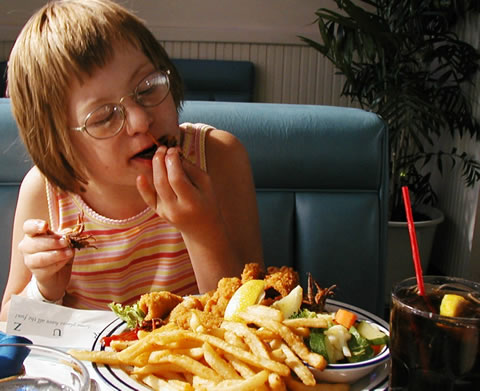Feeding
and Nutrition
Although feeding issues and
nutritional concerns vary considerably in the population of youngsters with Down
syndrome, there tends to be a common thread as the newborn moves into infancy
and then into childhood. The
reference for much of the information on this page is J.E. Medlen (2002). Please
see References for more information.
Neonates
Breast milk, particularly the antibody-rich colostrum, is particularly beneficial
to bolster the weaker immune system of babies born with Down syndrome. The extra
work of sucking required of breastfeeding babies can be extremely beneficial
to oral-motor development, preparing the mouth for speech activities later in
life. While the extra work is often too much for some neonates with Down syndrome,
who have significant congenital heart disease or other issues, many newborns
with Down syndrome and heart defects do successfully breastfeed.
Newborns with Down syndrome
who have difficulty with breastfeeding share some common problems:
- Becoming easily tired
during the feeding process (particularly babies with heart defects)
- Having difficulty mastering
the process of "latching on" to the mother’s nipple
- Being unable to suck
vigorously enough to get sufficient milk from the breast
On top of these inherent
physical problems with breastfeeding, many mothers are disheartened or misled
by well-meaning health professionals who discourage breastfeeding for neonates
with Down syndrome and significant health issues. While there are certainly
circumstances that preclude breastfeeding in ill infants, many mother-baby pairs
have succeeded, thanks to help from lactation specialists or occupational therapists
who are experienced in working with newborns with disabilities.
Instant
Feedback:
Breastfeeding
should be discouraged in neonates with Down syndrome who have congenital
heart disease.
Infants and Toddlers
Children with disabilities, including the population with Down syndrome, often
have difficulty using all of their senses in an appropriate manner in the eating
process. Because of sensory processing issues, oral-motor issues, or motor impairments,
they may be unable to successfully meet one or more of the following needs that
are integral to successful oral feeding:
- We smell the food while
it’s cooking and when it’s on our plate.
- We hear it being prepared.
We hear it when we chew it too.
- We see the food when
it is presented to us. We also see it while it’s being prepared.
- We feel it either when
we pick it up in our hands or in our mouth. If we’re lucky we feel it
both ways.
- We taste it if we put
it in our mouth.
- We need to be able to
balance ourselves to coordinate the movements required to pick it up and eat
it.
- We need to have an understanding
of our body. Once we eat the food, we need to know where it went and how to
follow it in our mouth with our tongue and not lose it.
- And last, we need to
agree to swallow it. Swallowing a food is a commitment to allowing it to become
a part of us.
It’s important to institute
appropriate physical adaptations to the child’s environment, and eating
tools, to allow successful intake of healthy, developmentally-appropriate foods.
Some accommodations commonly used for youngsters with Down syndrome include
the following:
- Use appropriate utensils
that are easy to use, consulting with an O.T. or speech therapist as needed.
- Use non-skid material
(dycem or shelf liner) under bowls and plates to keep them in place while
the child is learning to scoop or stab food.
- Place rolled towels or
small pillows to keep the youngster positioned in the high chair.
- Once the child outgrows
the high chair, use a small stool to support his feet under the table.
- Choose bowls and dishes
with easy-to-use handles.
Instant
Feedback:
Eating
is a natural developmental step, and toddlers with Down syndrome need no
special interventions.
Childhood
 Many children with Down syndrome are picky eaters, preferring certain food textures
and tastes. Strong food preferences and avoidances can be secondary to sensory
processing issues in these boys and girls. Medlen suggests the following tips
for introducing new foods to children who are notably resistant to trying new
flavors or textures:
Many children with Down syndrome are picky eaters, preferring certain food textures
and tastes. Strong food preferences and avoidances can be secondary to sensory
processing issues in these boys and girls. Medlen suggests the following tips
for introducing new foods to children who are notably resistant to trying new
flavors or textures:
- Remember that children
need to complete four sensory stages for successful eating: sampling the food,
exploring the properties of the food, accepting its odor, and accepting the
presence of the food.
- Understand that it may
take many exposures to a new food before the child is ready to try it. A rule
of thumb is 10 exposures for most children, and 50 or even 500 exposures for
a youngster with Down.
- Introduce new foods as
a side dish instead of the main course.
- Talk about the new food
in an interesting manner.
- Don’t comment on
what the child decides to put on his plate or in his mouth.
- Avoid pressure tactics.
- Let the child help prepare
new dishes.
- Give the child choices
about new foods. Let them choose from a list of 3-4 options.
 Many children with Down syndrome are picky eaters, preferring certain food textures
and tastes. Strong food preferences and avoidances can be secondary to sensory
processing issues in these boys and girls. Medlen suggests the following tips
for introducing new foods to children who are notably resistant to trying new
flavors or textures:
Many children with Down syndrome are picky eaters, preferring certain food textures
and tastes. Strong food preferences and avoidances can be secondary to sensory
processing issues in these boys and girls. Medlen suggests the following tips
for introducing new foods to children who are notably resistant to trying new
flavors or textures: